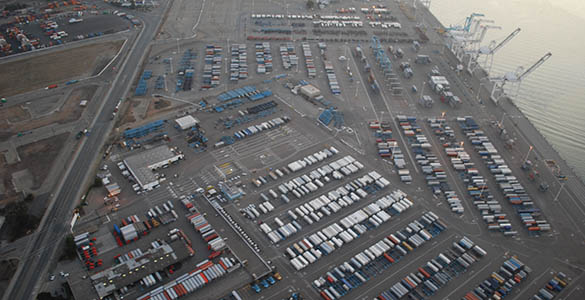The working waterfront is making headway to ensure a safer Bay for everyone, including recreational boaters. Through a recently-forged partnership, the Port of Oakland and its host city have been able to make significant improvements in security with the first phase of the "Domain Awareness Center" project.

The Port of Oakland and its host city have been able to make significant improvements in security by integrating Port of Oakland security cameras and an intrusion detection system with City of Oakland’s existing surveillance systems. Photo by Joel Williams
By Patrick Burnson
Published: April, 2014
The working waterfront is making headway to ensure a safer Bay for everyone, including recreational boaters. Through a recently-forged partnership, the Port of Oakland and its host city have been able to make significant improvements in security with the first phase of the "Domain Awareness Center" project.
The project, which has been controversial due to its potential for increased surveillance of Oakland citizens, integrates Port of Oakland security cameras and an intrusion detection system with City of Oakland traffic cameras, city geographic information system (GIS) mapping, and a gunshot detector called ShotSpotter.
"This project benefits both the port and the city in several ways," said spokespeople. "We’ve increased the visibility of Port of Oakland infrastructure for the city’s first responders, upgraded technology, digitally incorporated video and internet management tools, perfected the fiber optic uplink between the city and port and made other network improvements."
The working waterfront coalition has also created a new video wall for the City of Oakland’s Emergency Operations Center, which will enhance situational awareness during an emergency or disaster. Federal funding totaling $2.9 million was also put into the project.
"The port, along with its partners, generates more than 73,000 jobs in the region and supports nearly 827,000 jobs across the nation. And more than $40 billion worth of goods are shipped through the port each year," said spokespeople. "It’s vital to protect the people, environment and infrastructure that support those jobs and our economy. Getting timely and accurate information during an emergency is critical to saving lives and protecting property."
Port staffers are currently evaluating action taken by Oakland City Council last month to determine what the final Domain Awareness Center project will look like as they continue to move forward to improve Port of Oakland security.
Pasha Nabs Top Honors at Safety Banquet
Pasha Stevedoring & Terminals (PST), meanwhile, received top honors at the Pacific Maritime Association’s Annual Safety Awards Banquet last month.
PST scored first place in the Coast Accident Improvement, Coast Class B Stevedore Accident Prevention, LA/LB Injury Rate Improvement Award, Coast Group C Mechanic Operations, and Coast Accident Prevention Award Group B, Stevedore Operations categories. PST was also recognized with Coast 3 Year Zero Incident and Coast 1 Year Zero Incident Awards.
"In 2012, we implemented additional safety precautions," said PST Senior Director Bill McKinley. "The team not only made sure these particular rules were met, they also kept the cargo flowing at the same time. We are extremely proud of the PST team and their ongoing commitment to safety."
Garamendi Proposes New Energy Export Policies
While commercial maritime players are making the Bay a safer place for our citizens, political leaders are making a case for national security as well.
California State Representative John Garamendi—a Democrat whose district extends to the working waterfront of Vallejo—is championing a new merchant marine policy that could counter the trend of using "flags of convenience" by rebuilding the U.S. cargo fleet.
At the same time that we could be ensuring more security for vessels transporting liquefied gas, the United States would be creating thousands of new jobs and the foundation for massive energy-related exports. Similar proposals have recently been made by the Department of Transportation’s Maritime Administration, thereby suggesting bi-partisan support for such a significant change may be forthcoming.
At the National Maritime Symposium convened in Washington earlier this year, Garamendi noted that there was much discussion about exporting oil and natural gas.
"I have a question about that, because those are strategic national assets that give our nation a foundation for economic growth that no other nation in this world currently possesses. We should not squander it," he said. "We should not give it away just so some can have a higher profit and a better bottom line for the energy companies."

